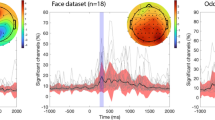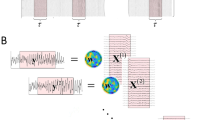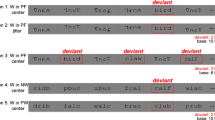Abstract
INVESTIGATIONS into the relationship between evoked potentials and human intelligence have been carried out by Ertl1, who claims to have found no evidence to support my earlier conclusion2 regarding this relationship. In my opinion, Ertl's work supports my conclusion that there is a significant difference between the evoked potentials for high and low intelligence groups. Although Ertl uses a Fourier analysis rather different from my own analysis, it should be possible to relate the two investigations (see, for example, ref. 3).
This is a preview of subscription content, access via your institution
Access options
Subscribe to this journal
Receive 51 print issues and online access
$199.00 per year
only $3.90 per issue
Buy this article
- Purchase on Springer Link
- Instant access to full article PDF
Prices may be subject to local taxes which are calculated during checkout
Similar content being viewed by others
References
Ertl, J. P., Nature, 230, 525 (1971).
Bennett, W. F., Nature, 220, 1147 (1968).
Lee, Y. W., Statistical Theory of Communication (Wiley, New York, 1960).
Chestnut, H., and Mayer, R. W., Servomechanisms and Regulating System Design, 1 (Wiley, New York, 1951).
Author information
Authors and Affiliations
Rights and permissions
About this article
Cite this article
BENNETT, W. The Fourier Transform of Evoked Responses. Nature 239, 407–408 (1972). https://doi.org/10.1038/239407b0
Received:
Revised:
Issue Date:
DOI: https://doi.org/10.1038/239407b0
This article is cited by
-
The relationship between short-term memory capacity and EEG power spectral density
Biological Cybernetics (1992)
Comments
By submitting a comment you agree to abide by our Terms and Community Guidelines. If you find something abusive or that does not comply with our terms or guidelines please flag it as inappropriate.



